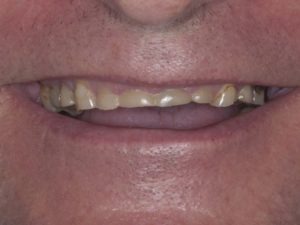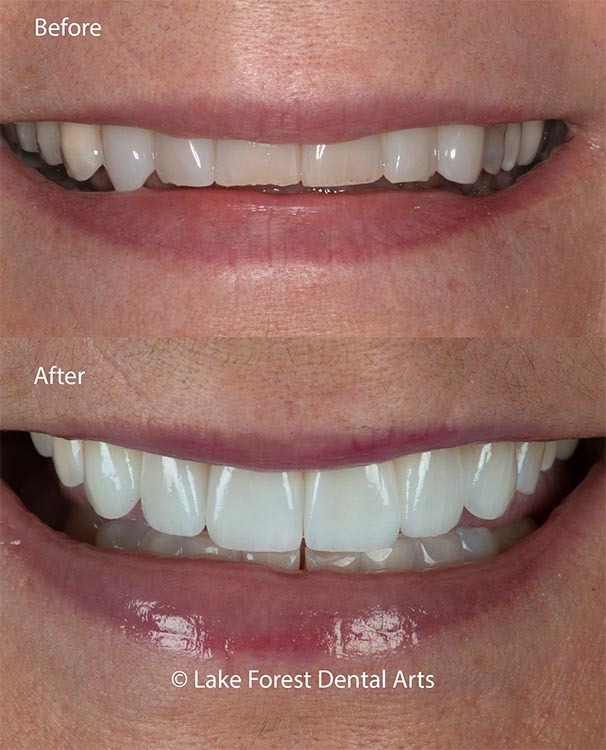
Teeth wearing done due to night time grinding, chronic bruxism
Are your teeth are wearing down? Bruxism, clenching or gnashing of teeth is common to everyone. Although everyone has some wear, the amount of structural loss varies dramatically.
Tooth on tooth contact and the subsequent loss of tooth structure or volume is called attrition. Tooth attrition can occur during the day or at night while sleeping. Most people do not believe that they grind or rub their teeth together at night but the vast majority do. There are many theories about why we grind, brux, or rub but nothing in the scientific literature has been proven.
Tooth Damage
Dental damage comes in many forms. For instance, things like cracks and fractures are the most well known types of damage, and can occur to varying degrees depending on each patient’s unique dental health.
Sometimes, though, the strength and integrity of your teeth can be compromised even when no crack or fracture is present. If your smile has worn down, for example, then they may be weaker than before and your whole bite may be thrown off balance.
Fortunately, your dentist can help by addressing the cause of your tooth wear and repairing the tooth structure that you’ve lost.
Healthy human teeth are made of some of the strongest and most resilient substances on earth. Yet, even healthy teeth aren’t indestructible, and when exposed to excessive pressure and friction, opposing teeth can quickly wear down. For many patients, the source of this friction is the consistent grinding of their teeth—a condition commonly known as bruxism. If you notice that the surfaces of the teeth are losing some of their structure, or if your bite feels like it’s becoming less balanced, then you should schedule an examination to determine how to fix it.

The patient above got new crowns to replace the smile he lost due to bruxism.
10 Common theories of why people grind or gnash their teeth:
- It is a genetic pre-disposition and therefore it occurs throughout life
- It is accelerated, heightened, or increased by stress but not initiated or generated by stress
- Hypoxic or hypopnic events associated with sleep apnea
- Some types of prescribed medications and drug abuse have been shown to cause heavier wear
- Positioning the jaw into a braced and clenched position during sports
- Compulsive habit of abusive chewing or clenching, biting on foreign objects, or tooth rubbing during daytime
- An unbalanced, non equilibrated or imperfect bite
- The muscles of the jaw are not balanced
- Psychological imbalance
- Jaw joint damage
It is more likely that tooth on tooth wear is caused by, attributed to, or accelerated by the first seven on the list above.

Veneers before and after
How to fix the problem of excessive tooth wear
The problem with worn teeth is that they affect nearly every aspect of your oral health. With less structure, they become weaker and more susceptible to further damage. They also become more vulnerable to tooth decay and cavities.
To fix the problem, your dentist will thoroughly examine your teeth and oral structures to check for bruxism. If necessary, you may be able to manage your grinding with a custom designed mouth guard, which protects you from grinding at night. Once a plan is in place to protect the teeth, dentistry can be done to replace your missing tooth structure with crowns or veneers.
Finding the right cosmetic treatment for dental wear and tear
Your dentist can help you understand your options when it comes to making real improvements to your smile. The loss of tooth enamel due to acid erosion for consuming acidic foods and drinks or acid reflux can be repaired with dental bonding.
Many people have had success using porcelain veneers to address damages caused by wear and tear. Veneers are placed over the front of your teeth, where they can hide problems like wear and tear, discoloration, and even some concerns with poor alignment. A bonding procedure relies on an application of composite resin to provide natural looking coverage for a tooth that appears unsightly.
Are your teeth wearing down?
Do you want to protect your teeth from the aging process? If you notice your teeth becoming increasingly more worn down, then you may be suffering from bruxism. If you’re looking for smile enhancement to repair short or translucent teeth, we offer dental care with a wide range of long term bruxism treatment solutions. Want to update that aging smile and save your teeth, schedule a consultation by calling us at 847-234-0517.
Our practice serves the Chicago metropolitan area including the North Shore and Northwest suburbs
